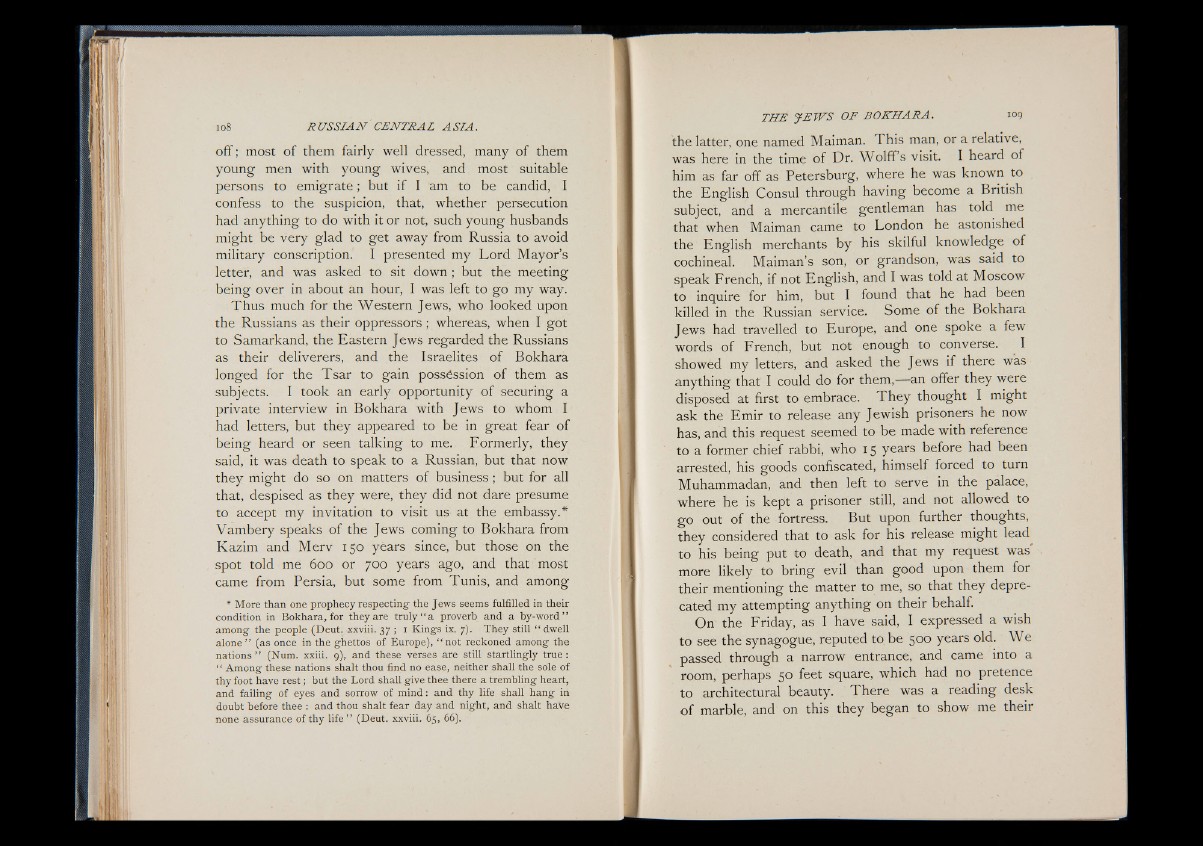
o f f ; most of them fairly well dressed, many of them
young men with young wives, and most suitable
persons to emigrate; but if I am to be candid, I
confess to the suspicion, that, whether persecution
had anything to do with it or not, such young husbands
might be very glad to get away from Russia to avoid
military conscription. I presented my Lord Mayor’s
letter, and was asked to sit down ; but the meeting
being over in about an hour, I was left to go my way.
Thus much for the Western Jews, who looked upon
the Russians as their oppressors ; whereas, when I got
to Samarkand, the Eastern Jews regarded the Russians
as their deliverers, and the Israelites of Bokhara
longed for the Tsar to gain possession of them as
subjects. I took an early opportunity of securing a
private interview in Bokhara with Jews to whom I
had letters, but they appeared to be in great fear of
being heard or seen talking to me. Formerly, they
said, it was death to speak to a Russian, but that now
they might do so on matters of business ; but for all
that, despised as they were, they did not dare presume
to accept my invitation to visit us at the embassy.*
Vambery speaks of the Jews coming to Bokhara from
Kazim and Merv 150 years since, but those on the
spot told me 600 or 700 years ago, and that most
came from Persia, but some from Tunis, and among
* More than one prophecy respecting the Jews seems fulfilled in their
condition in Bokhara, for they are truly “ a proverb and a by-word”
among the people (Deut. xxviii. 37 ; 1 Kings ix. 7). They still “ dwell
alone” (as once in the ghettos of Europe), “ not reckoned among the
nations ” (Num. xxiii. 9), and these verses are still startlingly true :
“ Among these nations shalt thou find no ease, neither shall the sole of
thy foot have rest; but the Lord shall give thee there a trembling heart,
and failing of eyes and sorrow of mind: and thy life shall hang in
doubt before thee : and thou shalt fear day and night, and shalt have
none assurance of thy life ” (Deut. xxviii. 65, 66).
the latter, one named Maiman. This man, or a relative,
was here in the time o f Dr. Wolff’s visit. I heard of
him as far off as Petersburg, where he was known to
the English Consul through having become a British
subject, and a mercantile gentleman has told me
that when Maiman came to London he astonished
the English merchants by his skilful knowledge of
cochineal. Maiman’s son, or grandson, was said to
speak French, if not English, and I was told at Moscow
to inquire for him, but I found that he had been
killed in the Russian service. Some of the Bokhara
Jews had travelled to Europe, and one spoke a few
words of Frenqh, but not enough to converse. I
showed my letters, and asked the Jews if there was
anything that I could do for them,— an offer they were
disposed at first to embrace. T h e y thought I might
ask the Emir to release any Jewish prisoners he now
has, and this request seemed to be made with reference
to a former chief rabbi, who 15 years before had been
arrested, his goods confiscated, himself forced to turn
Muhammadan, and then left to serve in the palace,
where he is kept a prisoner still, and not allowed to
go out of the fortress. But upon further thoughts,
they considered that to ask for his release might lead^
to his being put to death, and that my request was'
more likely to bring evil than good upon them for
their mentioning the matter to me, so that they deprecated
my attempting anything on their behalf.
On the Friday, as I have said, I expressed a wish
to see the synagogue, reputed to be 500 years old. W e
passed through a narrow entrance, and came into a
room, perhaps 50 feet square, which had no pretence
to architectural beauty. There was a reading desk
o f marble, and on this they began to show me their